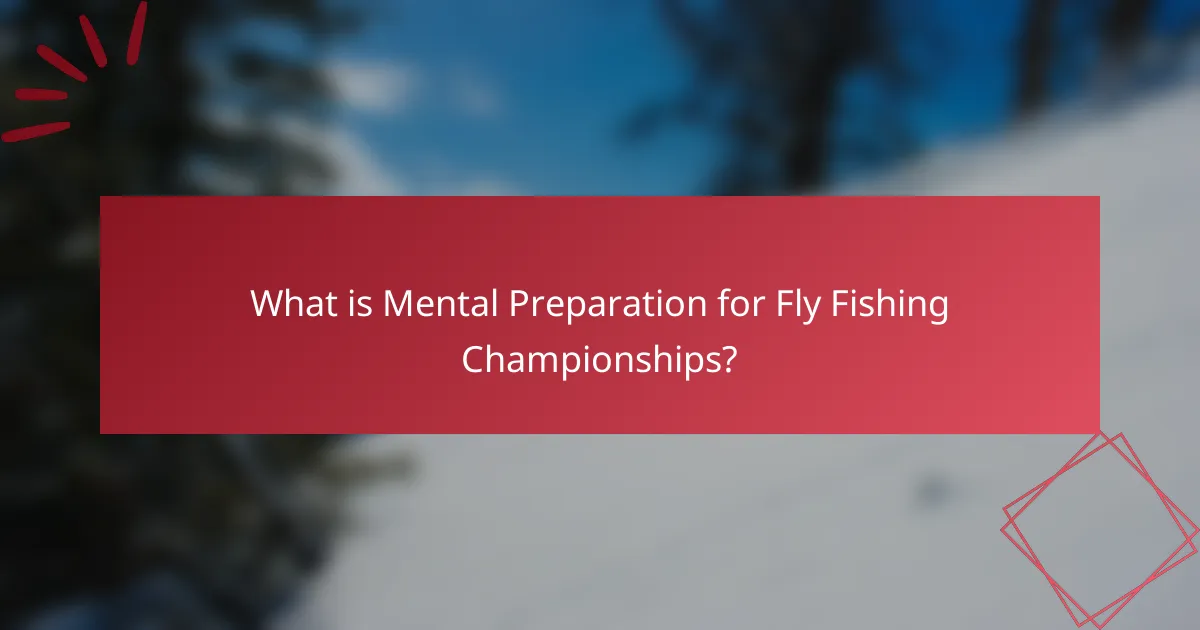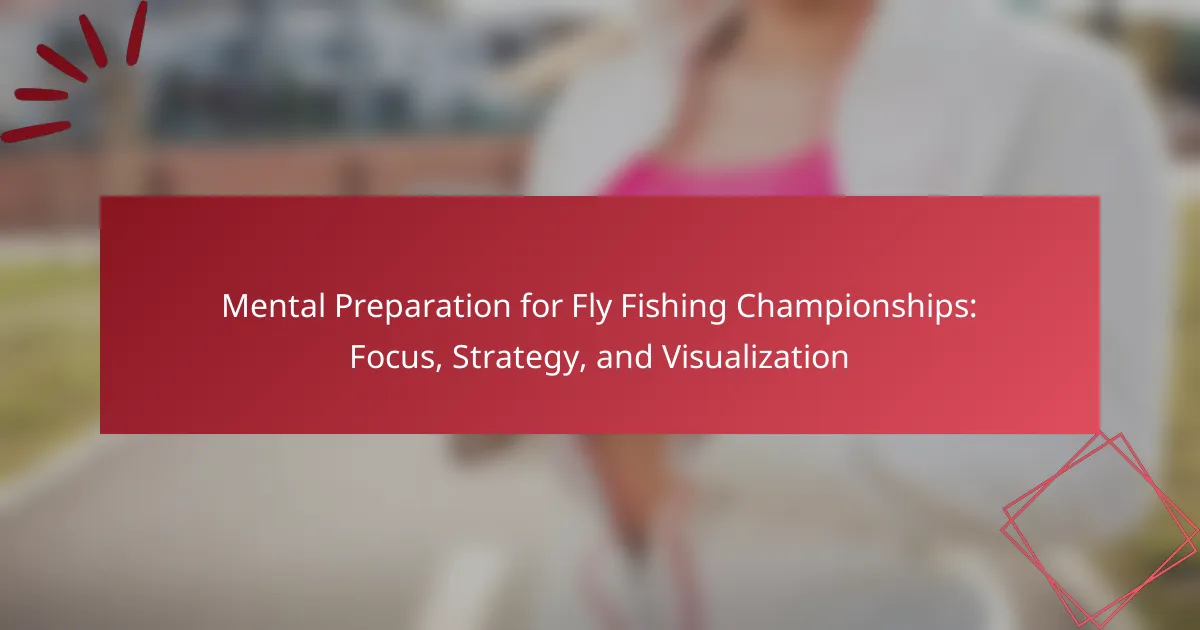Mental preparation for fly fishing championships is crucial for achieving optimal performance. Key psychological skills involved in this preparation include focus, strategy formulation, and visualization techniques. Maintaining focus enables anglers to concentrate despite distractions, while strategy formulation helps in planning approaches based on environmental conditions and fish behavior. Visualization techniques allow competitors to mentally rehearse successful scenarios, enhancing confidence and reducing anxiety. Research indicates that athletes who engage in these mental preparation techniques often experience improved performance outcomes compared to those who do not.

What is Mental Preparation for Fly Fishing Championships?
Mental preparation for fly fishing championships involves developing the psychological skills necessary for optimal performance. This includes focus, strategy formulation, and visualization techniques. Focus helps anglers maintain concentration despite distractions. Strategy involves planning approaches based on conditions and fish behavior. Visualization allows competitors to mentally rehearse successful techniques and scenarios. Research shows that mental imagery can enhance performance by increasing confidence and reducing anxiety. Studies indicate that athletes who engage in mental preparation often outperform those who do not.
How does mental preparation impact performance in fly fishing championships?
Mental preparation significantly enhances performance in fly fishing championships. It equips anglers with focus, strategy, and visualization techniques. Focus allows competitors to maintain concentration during the competition. This concentration helps in making quick decisions, which is crucial in dynamic fishing environments. Strategy involves planning and adapting to changing conditions, increasing the chances of success. Visualization techniques enable anglers to mentally rehearse their actions, improving muscle memory and confidence. Studies show that athletes who engage in mental preparation techniques often outperform their peers who do not. For instance, a study published in the Journal of Sports Psychology found that mental imagery can enhance performance by 20%. Thus, mental preparation is a vital component for success in fly fishing championships.
What are the key elements of mental preparation for fly fishing?
Key elements of mental preparation for fly fishing include focus, strategy, and visualization. Focus involves concentrating on the task at hand, minimizing distractions, and maintaining a clear mindset. Strategy encompasses planning the approach, understanding the fishing environment, and anticipating fish behavior. Visualization is the practice of mentally rehearsing successful fishing techniques and scenarios. Research shows that visualization can enhance performance by creating a mental blueprint for success. These elements collectively contribute to improved confidence and effectiveness during fly fishing.
How does focus enhance fly fishing performance?
Focus enhances fly fishing performance by improving concentration and precision in casting. When anglers maintain focus, they can better identify fish movements and adapt their techniques accordingly. This heightened awareness leads to more accurate casts and effective presentations of the fly. Studies show that focused individuals demonstrate improved hand-eye coordination, crucial for successful fly fishing. A study by Beilock et al. (2002) found that athletes who practiced mindfulness showed enhanced performance in precision tasks. Thus, focus not only aids in skill execution but also boosts overall success rates in fly fishing.
What strategies are effective for mental preparation in fly fishing?
Effective strategies for mental preparation in fly fishing include visualization, focus techniques, and strategic planning. Visualization involves imagining successful scenarios and outcomes while fishing. This practice can enhance confidence and reduce anxiety. Focus techniques help anglers maintain concentration on their goals and the task at hand. Mindfulness exercises, such as deep breathing, can improve present-moment awareness. Strategic planning entails setting specific objectives for each fishing session. This can involve choosing target species, locations, and techniques in advance. Research shows that mental preparation significantly improves performance in competitive sports, including fishing.
How can visualization techniques improve fly fishing outcomes?
Visualization techniques can significantly improve fly fishing outcomes by enhancing focus and mental preparation. These techniques allow anglers to mentally rehearse their casting and presentation strategies. By visualizing successful scenarios, anglers can build confidence and reduce anxiety. Research indicates that mental imagery can lead to improved motor skills, which is crucial for precise casting. A study published in the Journal of Sports Sciences found that athletes who practiced visualization showed a 30% improvement in performance. Therefore, incorporating visualization into training can lead to better results on the water.
What role does goal setting play in mental preparation?
Goal setting plays a critical role in mental preparation by providing direction and motivation. It helps individuals clarify their objectives and establish a roadmap to achieve them. Specific, measurable goals enhance focus and concentration during preparation. Research shows that goal setting can increase performance by up to 25%. By setting clear goals, participants can track their progress and adjust strategies as needed. This process fosters a sense of accomplishment and boosts confidence. Overall, effective goal setting is essential for optimizing mental readiness in competitive scenarios.
Why is focus critical in fly fishing competitions?
Focus is critical in fly fishing competitions because it directly impacts performance and decision-making. Competitors must concentrate on multiple variables such as water conditions, fish behavior, and casting techniques. Distractions can lead to mistakes, affecting the accuracy of casts and the ability to read the water. A study by the Journal of Sport Psychology indicates that heightened focus improves skill execution under pressure. In high-stakes environments, maintaining focus allows anglers to adapt strategies quickly. This adaptability can be the difference between success and failure in competitions. Thus, focus is essential for maximizing competitive advantage in fly fishing.
How can distractions be minimized during competitions?
Distractions during competitions can be minimized through focused mental preparation techniques. Techniques such as visualization help athletes create a mental image of success. This practice enhances concentration and reduces anxiety. Mindfulness exercises can also improve present-moment awareness. Setting specific goals keeps competitors focused on their performance. Creating a routine before competition helps establish a sense of normalcy. Additionally, controlling the environment by reducing noise and distractions is essential. Research shows that athletes who employ these strategies perform better under pressure.
What techniques can help maintain focus under pressure?
Breathing techniques can help maintain focus under pressure. Controlled breathing reduces anxiety and enhances concentration. Techniques such as deep abdominal breathing promote relaxation. Visualization also plays a crucial role. Imagining successful scenarios can improve mental clarity. Mindfulness practices, like meditation, further enhance focus. Regular practice of these techniques can build resilience. Research shows that athletes who use these methods perform better under stress. Techniques that combine mental and physical strategies are most effective.
How do mental strategies differ among competitive fly fishers?
Mental strategies among competitive fly fishers differ significantly based on individual experience and competition style. Some fly fishers rely heavily on visualization techniques to anticipate fish behavior and plan their casting. Others may focus on mindfulness to enhance concentration and reduce anxiety during competitions.
Competitive fly fishers also vary in their approach to goal setting. Some set specific, measurable targets for each session, while others adopt a broader mindset focused on overall performance improvement. Stress management techniques, such as deep breathing or positive affirmations, are also utilized differently among competitors.
Research indicates that experienced fly fishers often employ cognitive strategies that include problem-solving and adaptability to changing conditions. This adaptability is crucial during competitions, where conditions can shift rapidly.
In summary, mental strategies among competitive fly fishers are tailored to individual preferences and experiences, influencing their performance outcomes.
What unique approaches do top competitors use for mental preparation?
Top competitors in fly fishing championships use visualization techniques as a unique approach to mental preparation. They mentally rehearse their strategies and visualize successful outcomes. This technique enhances focus and builds confidence. Competitors also engage in mindfulness practices to reduce anxiety. They practice deep breathing exercises to maintain composure under pressure. Journaling their experiences helps them reflect and improve their mental game. Some utilize goal-setting strategies to create clear objectives for their performance. These methods are supported by psychological studies demonstrating their effectiveness in enhancing performance in competitive sports.
How can individual differences affect mental preparation strategies?
Individual differences significantly affect mental preparation strategies. These differences include personality traits, cognitive styles, and emotional responses. For example, introverted individuals may prefer solitary visualization techniques. In contrast, extroverted individuals might benefit from group discussions to enhance their focus. Research shows that individuals with high anxiety levels may require more structured mental preparation methods. This includes detailed plans and routines to manage their stress. Conversely, those with lower anxiety may thrive with more flexible strategies. Studies indicate that tailoring mental preparation to fit individual differences can improve performance outcomes. Thus, recognizing these individual traits is crucial for effective mental preparation in competitive scenarios.
What are common challenges faced in mental preparation for fly fishing?
Common challenges faced in mental preparation for fly fishing include anxiety, focus issues, and overthinking. Anxiety can stem from performance pressure during competitions. This pressure may lead to distractions that hinder concentration. Focus issues can arise from the need to juggle multiple tasks, such as casting and observing water conditions. Overthinking can result in second-guessing decisions, which may disrupt the flow of fishing. These challenges can negatively impact performance and enjoyment. Mental strategies like visualization and mindfulness can help mitigate these issues. Research indicates that mental training enhances performance in competitive sports, including fishing.
How can anxiety be managed before and during competitions?
Anxiety can be managed before and during competitions through various techniques. Deep breathing exercises help calm the nervous system. Visualization techniques allow competitors to mentally rehearse successful performances. Setting realistic goals can reduce pressure and enhance focus. Developing a pre-competition routine creates familiarity and comfort. Positive self-talk reinforces confidence and reduces negative thoughts. Engaging in physical activity can alleviate stress and improve mood. Research indicates that these strategies can effectively lower anxiety levels in competitive settings.
What are the signs of mental fatigue in competitive fly fishing?
Signs of mental fatigue in competitive fly fishing include decreased concentration and impaired decision-making. Competitors may struggle to maintain focus on their techniques and strategies. They might also experience increased irritability and frustration during competitions. Mental fatigue can lead to reduced motivation to fish effectively. Additionally, participants may find it challenging to adapt to changing conditions. Physical symptoms may accompany mental fatigue, such as headaches or difficulty sleeping. These signs indicate that mental fatigue is impacting performance and enjoyment in competitive fly fishing.
What practical tips can enhance mental preparation for fly fishing championships?
To enhance mental preparation for fly fishing championships, practice visualization techniques. Athletes should visualize successful fishing scenarios. This method helps build confidence and familiarity with competition settings. Additionally, develop a pre-competition routine. This routine can include relaxation exercises or meditation to reduce anxiety. Focus on setting specific, achievable goals for each competition. Research shows that goal-setting improves performance by providing clear direction. Lastly, engage in mental rehearsal of tactics and strategies. This approach enhances decision-making skills during actual fishing.
Mental preparation for fly fishing championships encompasses essential psychological skills that enhance performance, including focus, strategy formulation, and visualization techniques. Key elements such as maintaining concentration, planning approaches based on conditions, and mentally rehearsing successful scenarios contribute to improved outcomes. Research indicates that athletes who engage in mental preparation techniques often outperform their peers, with visualization shown to significantly enhance confidence and reduce anxiety. Effective strategies for mental preparation involve setting specific goals, practicing mindfulness, and developing routines to manage distractions and anxiety, ultimately leading to better performance in competitive fly fishing environments.
